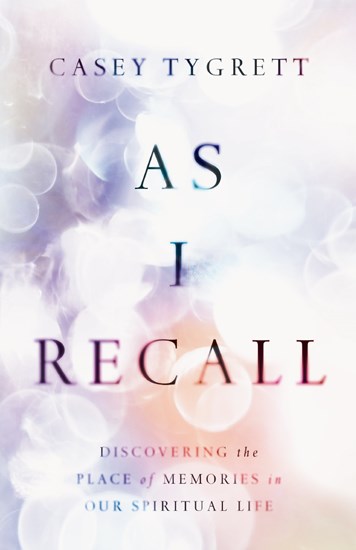As I Recall
 Memories are not just mental data points of past experiences. They are inner stories about ourselves, our relationships, and God that continue to shape us in this present moment.
Memories are not just mental data points of past experiences. They are inner stories about ourselves, our relationships, and God that continue to shape us in this present moment.
Working with students provides a panopoly of memories, each contributing to the ways we see ourselves and our work. There are days when the memories that come in most clear are moments of triumph when I felt like I made a deep impact on a student's life. Those are the moments I want to live in. But there are also days when the experiences I recall with most clarity are deeply painful and marked by failure. These are memories I wish I could erase from my mind.
Yet, in all these memories, God speaks. According to pastor and spiritual director Casey Tygrett, "We—and all those who have come before us—pick up the experience and we sense it: we feel its edges, notice its color, we smell the distinctive character (for shells it is the sickly seafood salt smell) of the experience and we try to make sense of what it is. Is it beautiful? How would you describe the color—the tones, the shades, wrapped around the ridges and swirls? Has it been damaged? Does the hard edge scrape our hand, leaving a blemish or a mark?"
In this excerpt from As I Recall, Casey Tygrett explores the power of memory and offers four steps to invite God to speak through key moments of our past. In our work on campus and our lives away from the university, I hope that Tygrett's words help us to actively remember and process the joys and sorrows of life in the presence of Jesus.
— Zach Baldwin
"Moving Towards Our Memories" - An Excerpt from As I Recall
Our engagement with our own memories also trains us for peaceful, civil interactions with others. When we see people acting in ways we consider outrageous or irrational, we might do well to remember that everyone we encounter is the way they are because of their memories. Of course, understanding this does not inspire us to enable but instead to empathize.
We are all containers of shells, some rough and broken and some colorful and fully formed. To count these shells is to know who we are, and to know who we are is to experience the wildness of redemption, mystery, and conviction that come through being “searched” and “known” (Ps 139) by a careful and loving God.
How do we go about engaging with our memories in an honest and transformational way?
Throughout the conversation, we must continue to come back to our key memories. We do this in order for the Spirit of God to help us make sense of and even redeem some of the shells we have collected over the years. The four movements that follow give us footing for engaging with the shells that may rise to the surface. Feel free to come back to these movements as you enter into the broader discussion about memories.
First, we bring the shell. This may be a difficult movement as our memories contain painful thoughts and harmful narratives that many of us have worked hard to release and redeem. You can practice “bringing your shells” in personal practice as you read or as you are accompanied by a therapist, counselor, or spiritual director you trust.
Second, we honestly engage with the implications. As someone who has spent the last twenty years teaching in public settings, I have had my share of follow-up correspondence regarding messages and teachings I’ve given. I have in my personal files some encouraging notes—people finding hope, challenge, encouragement, or enlightenment—and I turn to those when days become difficult.
However, I have one memory—a shell—that comes up as soon as I think about feedback. After one particular message regarding the intersection of science and the Bible, I heard (secondhand by the way, thus increasing the bitterness) that one of our staff received an email saying, “The Bible needs a better interpreter than Casey.”
I have carried that memory forward since 2011.
It has formed me.
So what are the implications of this memory for my formation in Christ? What does this nugget have to do with the way I see my calling, vocation, identity—even my self-confidence in presenting what I’ve been asked to present?
We bring the memories, stories, and scripts to the front, and we engage with the question, What did that moment, that expe- rience, that emotion mean then?
Third, we begin to look at what those implications have created. The experiences and memories we’ve gathered have created some sort of story. Stories about God, ourselves, and others are woven out of what we have experienced. The implications of my credibility and fitness to teach being questioned shapes my pride, the depth of my preparation, and cultivates in me the ability to realize not everyone is my biggest fan.
As we look at the implications of our memories of failure and success, frustration and fruitfulness, mystery and misunderstanding, we begin to see that these memories have shaped us immensely. We have something within us that directly ties to these memories and stories. That “something” is raw material for the journey of formation through redemption that causes the Spirit of God to salivate.
Finally, we explore how the Spirit of God is wooing and moving us through these particular memories and stories. Drawing on the experiences we’ve identified and the memories and stories they have written, we have an opportunity to revisit the daily scripts through which we’ve been living up to this point. We come to a sense of why—even if it is only a flicker—we are who we are, and we begin to ask questions about where God may be leading us as a result.
Are there conversations we need to have in order to re-engage long-accepted narratives that came as a result of our memories of a mom, dad, brother, sister or significant other? Are there practices such as prayer, fasting, and sabbath that we need to engage in so that we can begin to redeem narratives of foolishness, compulsion, and slavery? Is God moving in us so that we may have space to consider our past as relevant to our present and therefore understand the intense need for healing that has always been within us?
As we go, we bring these four movements into our observation and dialogue with the stories of Scripture. In them we find that the complicated litany of our memories is both messy and miraculous. In so seeing, we can take a deep breath in our own formation and release the pressures of perfection. Instead, we lean into the grace of the good journey.
— Adapted from As I Recall by Casey Tygrett. Copyright (c) 2019 by Casey K. Tygrett. Used by permission of InterVarsity Press, Downers Grove, IL. www.ivpress.com
If you enjoyed this excerpt, consider purchasing the book through InterVarsity Press. Remember, staff and administrators can get 40% off of IVP orders!
